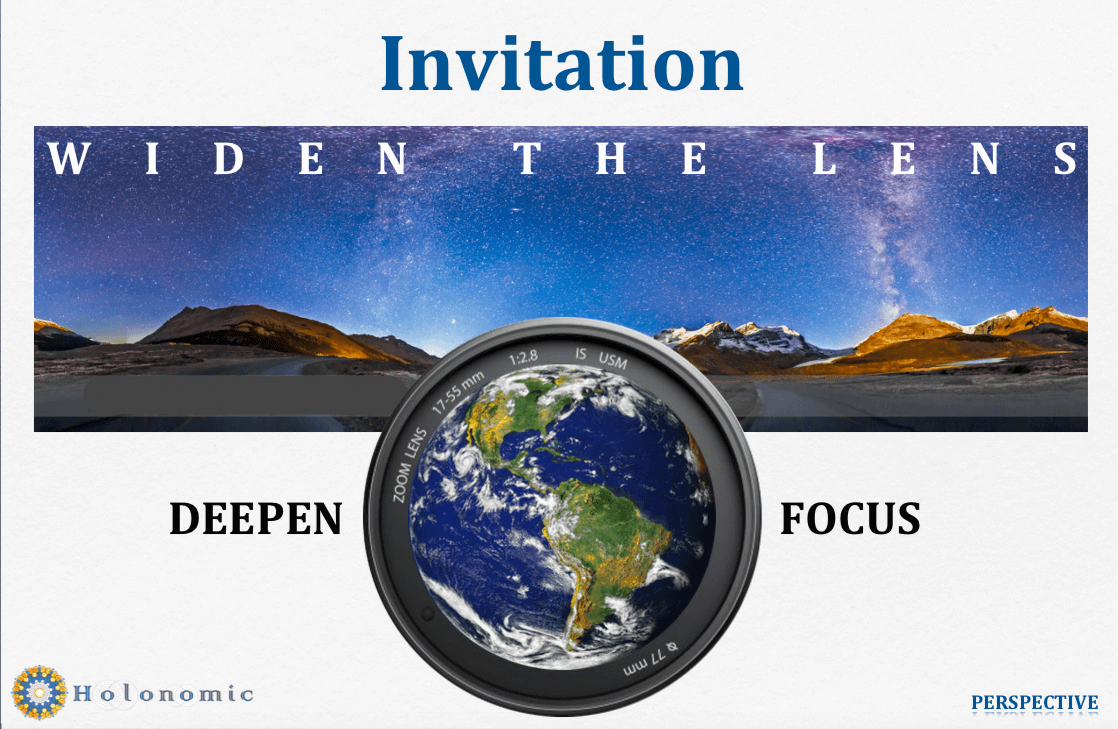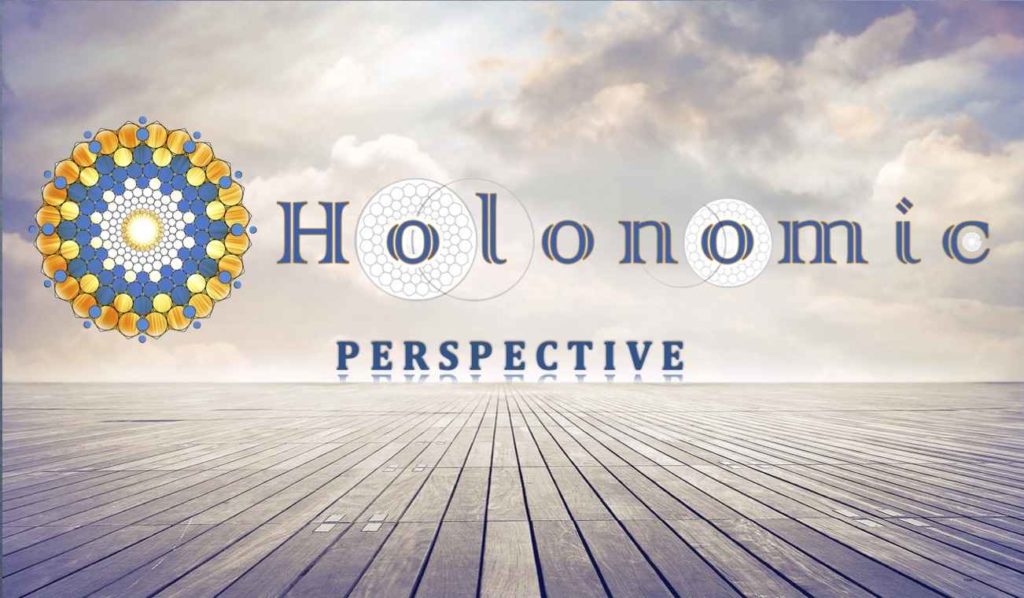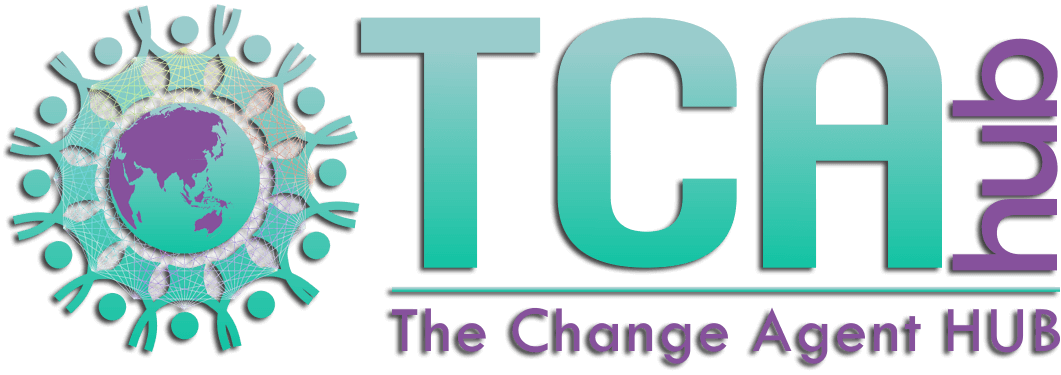HOLONOMICS
An Economic(al) Whole Systems Perspective
Holonomic Perspective: Introduction
By Steven Michael Ehlinger II
We are living in evolutionary times, where the conventional mechanisms of economics, including how co-creation is funded, and more intimately, our own relationship to money and each other, are being deeply examined, redefined, and reconfigured.
There is a return and movement toward something that feels more aligned, more resonant, more honoring, more fulfilling, more liberating, and more sustaining for ALL of the participants in the newly-forming arc of value creation and its underlying economic premise.
I like to refer to this premise as the Holonomic Perspective.
What is the Holonomic Perspective? Let’s break it down…
HOLO / ‘hälō / = a combining form meaning “whole” or “entire”
We intuitively know that the approaches that we have been taking relative to living systems, business practices, and resource allocation are missing something, and that they are not attending to important aspects of life as a whole. So, HOLOing anything means we inviting a much larger and more comprehensive approach to be embraced. We see the use of HOLO integrating into many of the progressive organizing models that we are drawn to today, whether that be The HOLOgraphic Living Model or HOLOcracy. Therefore, HOLOing out an economic perspective is long overdue, as it seems the very DNA encoded in the
seeds of current economic perspectives have left something (or many things) out of the equation.
ECONOMICS / ,ēkǝ’nämiks / = a social science that studies how individuals, governments, organizations and nations make choices on allocating scarce resources to satisfy their unlimited wants. It can generally be broken down into: macroeconomics, which concentrates on the behavior of the aggregate economy; and microeconomics, which focuses on the individual.
When there is a large enough body of perspectives at work, we tend to classify it as a science. Taking a closer look at the subject of economics and its history, we see that it emerged first from political science and the larger body of social sciences. These political and social science roots of economics are what have, for the largest part, governed humanity’s economic approach, and in particular, for the ruling class and politically empowered, to create a huge divide between the have(s) and the have not(s).
So, the Holonomic Perspective invites us to both widen our lens and deepen our focus with which we see the world, and to incorporate that vision in the design, implementation, operation, and e(valu)ation of the ongoing moment of creation, of which we are all a living and vibrant part. At the heart of the Holonomic Perspective is a connectedness to where we are making choices from and where those choices will lead us.

In delving deeper into my own journey of discovering what Holonomics meant to me, I explored some of the related terminology that exists in our current lexicon. I found the juxtaposition of the various terminologies we use to describe these aspects of our lives to be quite revealing as to the nature of many of the challenges humanity faces, individually, collectively, and globally.
ECONOMY / ǝ’känǝmē / = the arrangement or mode of operation of something; a system of interaction and exchange.
So, ECONOMICS is the science of choice-making relative to resource allocation, yet an ECONOMY is a system of interaction and exchange. Most systems are based in what I like to refer to as an “Agreement Field,” meaning, in order for that system to have come into being, a long lineage of agreements were required to have been made in order for that system to even exist. Many of the systems we were born into consist of agreements that were made by our ancestors well before we were even born. To that end, there exists an innate tension in us relative to operating under an agreement field in which we didn’t directly participate in the myriad choices that were made during the adoption of a particular system, especially when those systems have not incorporated newer insights that have emerged since the system became the de facto protocol.
ECONOMIC(al) / ,ekǝ’nämik(ǝ)l / = avoiding waste or extravagance.
So, ECONOMIC(al), as juxtaposed against ECONOMICS, would suggest our choices relative to resource allocation not be wasteful or extravagant. For me, this suggests an honoring of the deep relationship we have to resource; a coming into right relationship, so to speak. Sadly, whole civilizations could(have) exist(ed) and thrive(d) on the waste and extravagance we’ve agreed to give certain sectors within society.
Holonomics suggests there are other perspectives for choice points we might begin to embrace that are rooted in our core values of life, lasting fulfillment, and connected wholeness. This deep desire for wholeness (holo-ness) has provided the fertile soil for ever-progressive and restorative models of economics that are guiding us into what might be possible:
- Multiple-bottom lines
- Money as love
- Top-line economics
- Yin-Yang currency models
- Gift & compassion economies
- Radical sufficiency
- Sharing economies
- Sacred commerce
- Resource-based economies
- Sacred economics
- Co-operative & generative models
- A return to barter & trade
- Sacred marketplace
- Use of alternative currency models
- Activating the real wealth of nations
All are serving their part to open us up to new possibilities, return us to our deepest roots where the alchemy of our collective soul’s yearning can begin to take form. From the Holonomic Perspective, all are welcome and serve as bridges back and into an economic perspective that works for ALL.
The Holonomic Perspective suggests an opportunity exists for us to seed and root our economic models and operating systems in a set of core values that will deeply resonate with all of life, to provide a new basis for ascribing value. It also suggests us to come into a profound honoring and embodied respect with each and every participant and resource being utilized in the creation of the value contained within the respective products and services that we co-create, offer, recommend, support, and utilize.
HOLONOMICS / ‘hälō’nämiks / = an economic(al) whole systems perspective that is seeded, rooted, and deeply connected to the vibrancy of universal core values and promotes the emergence of new and adaptive systems of governance, operation, interaction, and exchange that provide harmony, true balance, and an innate and generative prosperity for all.



